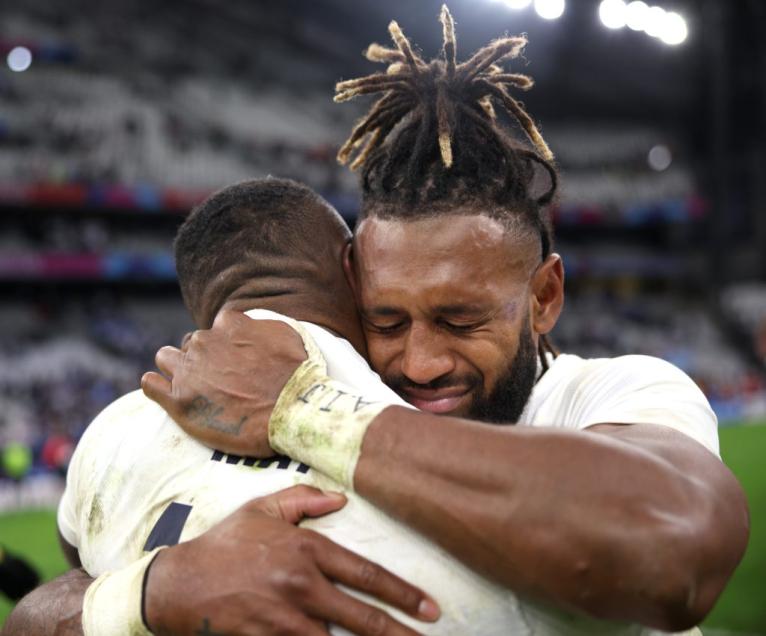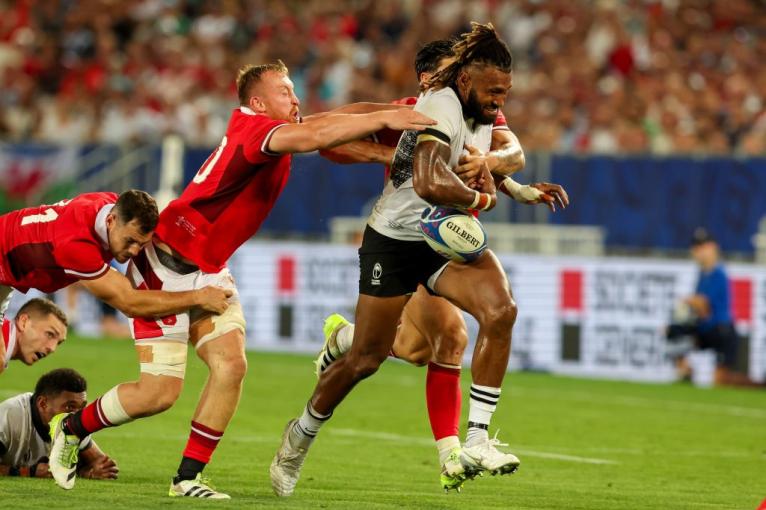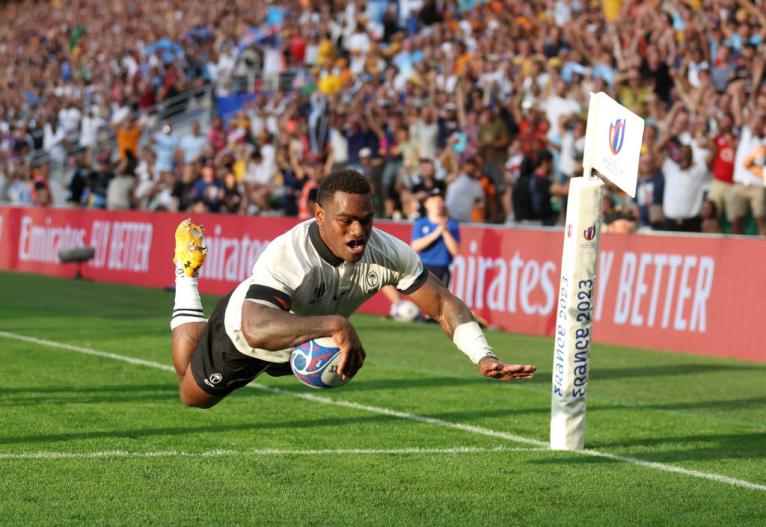Sadro is a quiet Fijian village set among the vegetation of the main island’s southern coast. The Navua River snakes off to the east, flowing into the Pacific Ocean. Waves lap at the shore to the south, where men dive and spearfish to feed their families. The arterial Queens Road which rings the island lies to the north and beyond that, the peaks of Viti Levu’s mountainous interior protrude on the horizon.
At the last census, Sadro’s population numbered around 200. And yet, when Waisea Nayacalevu returned home from the Rugby World Cup, the place had the energy of the Mall on coronation day. Community, faith and rugby are three great pillars of Fijian life and when a village boy captains the national team on the grandest stage of all, the celebrations are thunderous.
Children chanted in the streets, serenading the vehicle carrying their hero as it bounced down the road. The women sang. The men cheered. There was dancing and music and feasting and of course, a kava session. It was as if the Lord himself had ridden into town.

Nayacalevu’s heart beats for these people. He is the first man from Sadro to play for his country and the locals refer to him fondly as ‘gone ni Nasareci’ – child of Nazareth. They have been his ‘why’ for the longest time, even now as he sits on the Cote d’Azur with the sleek Toulon training base and over a dozen years of handsome professional contracts behind him.
The eldest of five siblings, three of whom have played elite rugby, his parents separated when Nayacalevu was 10 and the children were sent to live with their grandparents in Sadro.
“They didn’t have any work,” Nayacalevu remembers. “My grandfather taught me a lot of lessons, to go and work hard every day to find something to sell and put food on the table. And whatever we had, we shared.
“I would go looking for coconuts to sell at the markets so we could get cash for food. I learned from my grandfather, every day you have to sweat before you put something in your mouth; you have to work for your breakfast.
The last ten years I’ve been with the Fiji team there’s been a lot of differences in players. People go their own way sometimes. They don’t really, really bond together.
“He taught me a lot of discipline, manhood and all of that. He showed me how to take care of my family, and I tried to help my siblings and put smiles on their faces. He passed away about 10 years ago, I wish he was alive and I could get him over to France to experience the life I have here.”
These are memories Nayacalevu carries with him all these years later. He has been in France since 2012; a decade at Stade Francais yielding a Top 14 title and a Challenge Cup; two more seasons at Toulon capped by another European title. Come summer, at 34, he will fill a Manu Tuilagi-shaped hole in the Sale backline.
If you’d told a teenage Nayacalevu about this glittering CV, his head would have been blown clean off its shoulders. He was a pup on the HSBC SVNS circuit when he sat down in London to thrash out his first deal with Stade and even then, had little grasp of what he was signing up for.
“I had no idea where France was, I had only heard about it on the news or on television,” he laughs. “I had no knowledge of the French language. I watched videos of Rupeni Caucau and Vilimoni Delasau, some of the legends who played in France, but never in my dreams did I think I would be there.
“When I got to Paris, my eyes were like… wow! It was like the first time being given candy. Those first few months were hard, I was homesick, but I kept reminding myself, ‘I’m going to do it, I’m going to keep on going, I’m going to learn and get through this’.
“A few years later standing in the Top 14 final, my eyes were filled with tears. Playing alongside legends like Morne Steyn and Sergio Parisse – I saw these people on TV, now I’m playing with them.”
Today, Nayacalevu belongs in the same pantheon. As he enters the twilight of his career, he remains one of the finest centres anywhere on planet rugby. In the past year, Nayacalevu skippered Simon Raiwalui’s remarkable Fijians to a first win over England before a Twickenham crowd part mesmerised, part horrified; a first win against Australia in 69 years; a second-ever appearance at a World Cup quarter-final and first since 2007. They nearly roared back to sink England again in the last eight.

Raiwalui took Fiji back to their roots to prepare for the tournament. Players slept on the floor of a town hall in Taveuni, the third-largest of the Fijian islands. They immersed themselves in cherished memories, the people and the place they were representing. The upshot was an organised, diligent and united group. A Fiji squad with those qualities – underpinned by a ‘play-like-Fijians’ ethos – is an awesome force.
“That World Cup campaign was the highlight of my career,” Nayacalevu says. “I’m just being honest, the last ten years I’ve been with the Fiji team there’s been a lot of differences in players. People go their own way sometimes. They don’t really, really bond together. The last World Cup, the team we had were bound together, young and old.
“We changed the culture – to be consistent, hard-working, disciplined and honest. Going to Taveuni gave us the mindset we are here for a reason. It took me back to my childhood in the village, sleeping on the floor. It humbled me, a feeling only I can understand because I grew up in the village and to go back and reconnect was amazing. It’s a dream for the people of Taveuni for the national team to come back and camp in their village. It really sparked us. We were coming with a mindset to win the World Cup.”
I still don’t understand today because if my son passed away, I would definitely leave. He told me, ‘I’ll be good, I know he has gone to a better place – my heart is okay’.
It’s a tantalising thought. But not outrageous. Consider the players Raiwalui took to France. A backline laden with gold, from Semi Radradra and Josua Tuisova to Nayacalevu himself; back-row titans in Bill Mata and Albert Tuisue; the La Rochelle demolition man Levani Botia turning men to rubble; Northampton’s Sam Matavesi and Saracen Eroni Mawi spearheading the scrum. In Caleb Muntz, who missed the World Cup through a desperately ill-timed injury, they have a burgeoning fly-half who can run the show and nail his goals.
Many will retire before the next global showpiece in 2027, but there is now enticing sustainability on the islands. The Fijian Drua are tearing up Super Rugby, staging matches before frenzied crowds in Suva and Lautoka, and providing a torrent of players to the national squad. Youngsters need no longer chase opportunities overseas with professional rugby on their doorstep. Raiwalui established a high-performance base in the capital and a long-term strategy for the Fijian game. Current Drua coach Mick Byrne will soon succeed him in the top job. Fiji will never wield the financial riches of the European big dogs, but in the talent stakes, they might be wealthiest country in the whole sport.
“We want to show the next generation nothing is impossible,” Nayacalevu goes on. “If you are consistent, focused and committed, you can achieve anything. I believe we can win the World Cup if we gauge those things properly and we have a good team culture to guide that.”
A campaign built on deep emotional meaning was also marred by terrible sorrow. Midway through the pool stage, Tuisova, Nayacalevu’s mighty centre partner, received word his seven-year-old son had died after a long illness. Faced with this unfathomable loss, Tuisova chose to stay with his brothers and see out the World Cup.
“We gave him all the freedom and help to go back to Fiji,” Nayacalevu says. “I’m so fascinated by the man, that he chose to stay with the team. It showed how he is as a person. He has a big heart and he wanted to give his all to the team. I still don’t understand today because if my son passed away, I would definitely leave. He told me, ‘I’ll be good, I know he has gone to a better place – my heart is okay’. That touched me. He is a good friend.”

Nayacalevu will not grace the World Cup arena again. He knows he could make it to Australia in three years, that his form remains compelling and his body supple, but he knows, too, the Drua boys making history back home deserve their shot.
“I want to go two more years all-in and leave it all out there. I can go four more years, no problem, but I want to give that chance to the younger generation. I think it’s time for them to come up and take responsibility. That’s the cycle of rugby. It’s their chance to shine their light to the world.”
His influence on Fiji will not wane with retirement. He will explore avenues in coaching and property investment, and longs to mentor his countrymen through the turbulent waters of elite rugby. Pasifika players are often pressured to provide for swathes of extended family and villagers. There is a history of rogue agents, lack of financial advice and support for life after rugby. Too many – some, giants of the game – are left destitute by the time careers are finished and the well runs dry.
“Most Fijians are so shy to talk, to learn and do things,” Nayacalevu reflects. “I have learned a lot over the years and I have a plan in my head. I think nobody educated past generations well enough to prepare them for life after rugby. People are not well informed and not willing to learn, sticking to a tunnel-vision view. For me it is different because I learned on the way, I saw things outside of rugby, and pre-planned my life like that.
“One of the things I want to give back to the future generations is to consult them about that, about professionalism, diet, and planning for the future.”
I could have probably signed for another French club but I said to myself, I want to go and learn more and see the difference between the two rugby-wise and experience-wise.
All of this is a way down the track. Nayacalevu has more to give on the field, taking his intoxicating flair to Manchester next season. For all Tuilagi’s prestige, his brutal injury record and Nayacalevu’s pedigree mean the Fijian could, crazy as it sounds, prove an upgrade.
“I’ve been in France for 13 years now and I wanted to get an experience of English rugby. I’m grateful to the Sharks for giving me that opportunity. I could have probably signed for another French club but I said to myself, I want to go and learn more and see the difference between the two rugby-wise and experience-wise. I’m so excited and I’m willing to learn and grow to get the maximum out of it. I want to give them my experience as well.”
Home is never far from his thoughts. He still gives generously to the people of Sadro, the community who nurtured him. He has built four-bedroom houses for his parents and given each a car, paid for new chairs in the village church, bought rugby balls and kit for his old school, and food for all of his elderly neighbours. He flew his father, Waisale, out to France to watch Fiji play Georgia in their penultimate pool match. It was Waisale’s birthday and his son scored a brilliant try.
“[My childhood] made me who I am today. It taught me about values and life, helping yourself and your family in any way. I worked for everything I have now and I appreciate what I have. The experience gave me the wise and humble mentality. I will always keep that in me and take it wherever I go.”


Love and respect to Fiji but not a chance outside of 7s
Yes, Fiji can win the World Cup!
With that belief plus their christian faith🙏
and hard work it is achievable.
Great article.
Ian Duncan
Fiji resident 1981-84
Fiji deserve to be in the rugby championship, fans love seeing the Fijian national team play, the Fijian Drua is a wonderful idea but the players can still be stolen to play for NZ and AUS…
‘Stolen’ lol. Like NZers ride through Fijian villages on horseback kidnapping all their top rugby talent.